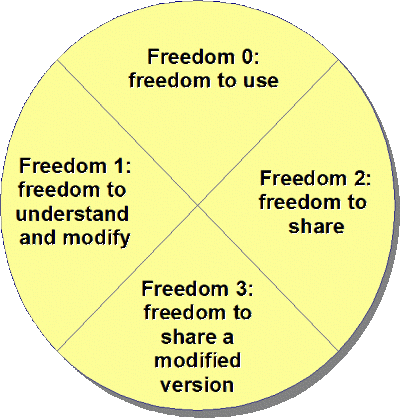Philosophy and Terminology
Overview
Philosophy
History
Categories
Distros
Server
Desktop
Education
Programming
Explore
Glossary
Resources
Section Objectives:
- Describe the four freedoms protected by free software.
- Define terms relevant to software, copyright, and licensing.
- Compare and contrast free and proprietary licenses and underlying philosophies.
- Analyze software licenses and determine whether the four freedoms are protected.
- Explain the difference between free software and open-source software.
Andy Carvin introduces free, open-source software in his blog, Learning.Now, which is hosted by the PBS site for teachers. He follows his initial introduction with an interview of David Thornburg, founder of the Thornburg Center for Professional Development.
This extensive collection of links from India includes a general introduction to free, open-source software as well as 16 other sections related to the topic - check out the section on education in Section 8 and the list of personalities in Section 13.
Conversations with many of the personalities in the free, open-source software movement are made available due to the work of Steve Hargadon of EdTechLive.
Many, many more examples of live CDs are available.
Suggested Activities:
- Review the resources listed in the Themes section and the terms listed in the Glossary page. Locate other definitions for these terms and draft your own version.
- Read Richard Stallman's essays about free software and about the four freedoms, review the GNU Public License (GPL), and then compare the GPL to the license for your favorite software application.
- Explain the four freedoms to a colleague. Consider to what other types of work these four freedoms might apply.
- Locate references to free or open source software in popular media. Find a print advertisement for a free software program other than a version of Linux.
- Hands-on activity, use a live CD to boot and explore a free software distribution.
Themes:
Freedom
What are these freedoms? In
typical programmer style, they are numbered starting with 0. Freedom 0
is the freedom to use a software application in any manner that you
like. Of course, this isn't intended to condone illegal activities, but
instead, is intended to allow the user the freedom to determine the use
of the software instead of its use being limited by the copyright
holder. Read more about the four freedoms here: http://www.gnu.org/philosophy/free-sw.html.
Listen to Richard Stallman describe the four freedoms in this mp3 file:http://www.youtube.com/watch?v=uJi2rkHiNqg&feature=related
HackingIn common parlance, hacking is
equated incorrectly with illegal, immoral, or unethical activities. In
the software development world, the term, hacker, recognizes the coding
prowess of an individual. A hack is a clever innovation that builds on
the work of others in some novel way. Stallman has described the
concept of copyleft
as a hack of copyright - in which the essential concept is modified in
a clever way. Stallman used licensing that protects copyright holders
to protect the freedom of software users. Read more about the concept
of hacker here: http://en.wikipedia.org/wiki/Hacker.
Eric S. Raymond provides a great view of the hacker culture in his 2001
publication, How To Become A Hacker. See: http://www.catb.org/~esr/faqs/hacker-howto.html
Sharing and
UbuntuFreedom and hacking do not offer
benefits to society without a commitment to sharing and helping others.
If you listened to the first 10 minutes or so of Steve Hargadon's
interview with Richard Stallman (linked above), you learned about the
role of sharing in the philosophy of the Free Software Movement. Read
about how the concept of copyleft protects users' freedoms through the
GPL here: http://www.gnu.org/licenses/.
The
notions of sharing and community are perhaps best embodied in the
African concept of Ubuntu,
which is also the name of a popular GNU/Linux distribution and the root
of an education-oriented distribution called Edubuntu. Read more
about this concept, including Archbishop Tutu's definition of it, here:
http://en.wikipedia.org/wiki/Ubuntu_(ideology).
Open SourceNoting the ambiguity in the
English word, free, efforts are needed to explain what free software
actually is. Is it software that doesn't cost anything? Not
necessarily. Better, but less appealing, terms would be unrestrained or
liberated
software, but even those need to be explained to software users. In
1998, Eric S. Raymond and a small group of advocates coined the term,
open source. Their motivations are presented here: http://www.opensource.org/history
and the definition of open-source software can be found here: http://www.opensource.org/docs/definition.php.
After reading this material and comparing it with the Free Software
Foundation's philosophy and the four freedoms protected by copyleft,
you may perceive a controversy here. Your perceptions would be correct.
Resources:
Other Podcasts
- Steve Hargadon's Interview with Eric S. Raymond: http://www.stevehargadon.com/2006/09/interview-with-eric-s-raymond-on-open.html
- FLOSS Weekly's (Chris DiBona and Leo Laporte) Interview with Eben Moglen, the General Counsel of the Free Software Foundation: http://www.podtrac.com/pts/redirect.mp3?http://twit.cachefly.net/FLOSS-013.mp3
